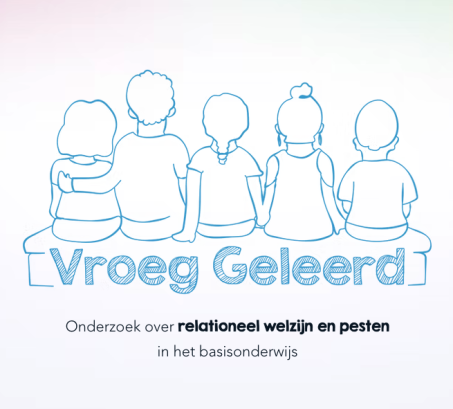
BIRMM Spotlight Interview: Understanding Identity-Based Bullying in Flemish Primary Schools with Prof. Dieter Vandenbroeck
In this BIRMM Spotlight interview, we welcome Professor Dieter Vandenbroeck, a sociologist at the Brussels Institute for Social and Population Studies (BRISPO) at Vrije Universiteit Brussel (VUB), to discuss Primary Prejudice, a groundbreaking SBO project on social well-being and identity-based bullying in Flemish preschools and primary schools.
Thank you for joining us, Professor Vandenbroeck. Could you start by introducing yourself and your role in this project?
Of course. I’m a professor of sociology at VUB, where I also lead the research unit on childhood, culture, and cognition. My research focuses on early childhood, primary socialization, and early social relationships. Within Primary Prejudice, I am the principal investigator, responsible for overseeing the project alongside our research coordinator, Maaike Jappens, and valorization coordinator, Marloes Hagenaars. Together, we manage everything from research design and data collection to outreach and stakeholder engagement.
Could you explain what the project is about?
Primary Prejudice is the first project of its kind to focus on social and relational well-being in Flemish preschools and primary schools, with particular attention to bullying behavior. Bullying remains widespread, statistics show that about one in five children report being victims. Yet these figures typically only cover children aged 10 and above, since large-scale surveys rely on questionnaires, which younger children can’t easily complete. We know, however, that bullying begins much earlier, even in preschool.
Our aim is to fill that gap by developing methods better suited for young children. Rather than forcing children to adapt to conventional research tools, we design tools that fit their experiences. Central to the project is understanding identity-based bullying, where children are targeted because of characteristics such as skin color, gender, body shape, or ethnic background. We study not just prevalence, but also the circumstances that foster or discourage bullying, the role of teachers, and the messages conveyed through textbooks and teaching materials.
How do you define identity-based bullying, and why is it so important to study this in young children?
Identity-based bullying involves targeting others because of identity markers, be it race, gender, body shape, or other visible traits. While any form of bullying is harmful, identity-based bullying is especially damaging for young children, as it strikes at aspects of themselves they cannot change.
Research suggests that a large share of bullying may be identity-based, though precise figures are lacking. This is why we’re committed to mapping its prevalence. Interestingly, there’s been a recent shift in how bullying is understood. Traditionally, definitions focused on individual aggressors and victims. But today, scholars increasingly recognize bullying as a social process influenced by broader social norms, including those modeled by adults. This shift highlights the importance of examining identity-based bullying, as it reflects deeper societal issues being reproduced in school settings.
Why the focus on Flemish schools in particular?
First, our funding and networks are based in Flanders, which allows us to work closely with schools. There’s already significant awareness of bullying here, Flanders even has a National Week Against Bullying, but research has largely concentrated on teenagers. Younger children are often overlooked, with their experiences dismissed as “teasing.” We want to challenge that view and provide evidence that bullying is very much present in preschool and primary school.
Who are your key partners in the project?
We work with a strong consortium of academic and non-academic partners. At VUB, the sociology department leads research on social identity and relationships. Our colleagues in criminology ensure a children’s rights perspective, helping us translate rights principles into practice and actively involve children in the study.
We also collaborate with Professor Hilde Cotpin from KU Leuven, a school psychologist who focuses on how teachers respond to bullying. Teachers’ reactions often determine whether bullying escalates, stops, or is prevented, so their role is crucial. Finally, we work with Appelhof School in Antwerp, particularly their preschool teacher training program. They help us adapt our methods for very young children and ensure our findings are translated into practical tools for teachers.
You’ve just completed your first round of fieldwork. What has that experience been like?
In one word: intense. Over a year and a half, we collected data in multiple schools across urban and suburban contexts, interviewing nearly 1,100 children multiple times. The process was logistically demanding and emotionally challenging, given the sensitive topic.
Yet it was also incredibly rewarding. We were struck by children’s enthusiasm to participate, sometimes so eager that we had to make sure they didn’t join interviews more than once! Over time, we became part of their school communities. Teachers and principals also supported us tremendously, which made the work possible.
What kind of impact do you hope this project will have?
We are ambitious. If our work ends in a simple website or brochure, we will have failed. Our aim is to create meaningful change for three main audiences: children, teachers, and the wider public.
To achieve this, we collaborate with over 25 stakeholder organizations, including major school networks, NGOs, and broadcasters such as Ketnet and Canvas. This ensures our findings reach both children and adults. Most importantly, we hope to influence teacher training curricula. Many teachers and principals tell us they face bullying daily but feel underprepared to respond effectively. By equipping them with tools to detect, understand, and address bullying, we can create lasting impact.
We’re still early in the project, but by involving stakeholders from the beginning, we’re laying the groundwork for structural change.
Thank you, Professor Vandenbroeck, for sharing these valuable insights.
Thank you!
You can follow more about the Primary Prejudice project, its updates, and upcoming events on the project’s official website (click here) and via their LinkedIn page (click here).
Watch the full interview with Prof. Dieter Vandenbroeck here:
